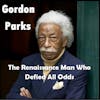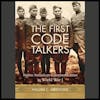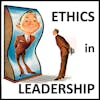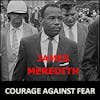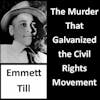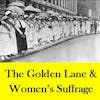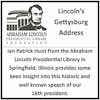Pretty Boy: The Reality of Youth Trafficking
Filmmaker Kevin Coleman-Cohen's journey in addressing youth in need who are homeless and being exploited, through the impactful narrative of the film 'Pretty Boy'. He also delves into his views on the power of storytelling in shedding light on human trafficking issues, emphasizing the importance of raising awareness and taking action.
An in-depth conversation with Kevin Coleman-Cohen, a director, producer, filmmaker, and educator deeply involved in social issues. Kevin discusses his film 'Pretty Boy,' which focuses on the life of a homeless male black teenager navigating survival sex in St. Louis. The narrative offers a poignant insight into male sex trafficking and exploitation, challenging stereotypes and highlighting the issue's complexity.
Kevin shares his career journey, emphasizing storytelling's power and advocating for the unheard and unvalued. The discussion also touches on the importance of giving back, creating experiences, and the critical role organizations like Youth in Need play in supporting at-risk youth. The episode aims to enlighten listeners about the realities of youth exploitation, the creative process in filmmaking, and the impact of community involvement in addressing such pressing social issues.
[00:00] Exploring Gender Stereotypes in Trafficking
[00:09] Introducing 'Pretty Boy' and Its Director
[00:34] Welcome to St. Louis In Tune
[00:49] A Lighthearted Banter with Mark Langston
[01:28] Addressing Community Needs and Transportation Issues
[03:55] Kevin Coleman's Journey and Achievements
[06:19] The Reality of Youth Trafficking and Exploitation
[10:43] Youth in Need: A Beacon of Hope
[16:20] Kevin Coleman's Filmmaking Journey and Inspirations
[23:28] Raising Awareness: 'Pretty Boy' at the National Crime Victims Awareness Week
[24:40] Supporting the Dred Scott Heritage Foundation
[25:41] About Saint Louis In Tune
[27:19] Meet Kevin Coleman-Cohen: A Filmmaker's Journey
[27:38] Accolades and Recognition for 'Pretty Boy'
[28:43] The Emotional and Financial Journey of Making 'Pretty Boy'
[30:53] Inspiration Behind 'Pretty Boy': Addressing Youth in Need
[38:23] The Challenges of Addressing Human Trafficking and Sex Work
[44:44] The Filmmaking Process and Funding Challenges
[48:34] Kevin's Vision for Future Filmmaking and Storytelling
[51:42] Advice for Aspiring Filmmakers and Addressing Trafficking Victims
Crime Victims' Awareness Week Film Screening & Expert Panel
Help is available; speak with someone today
- National Human Trafficking Hotline
- Hours: 24 hours, 7 days a week. Languages: English, Spanish.
- 888-373-7888 SMS: Text INFO to 233733
- Home - Youth In Need
- Home | National Human Trafficking Hotline
- Crime Victims' Awareness Week Film Screening & Expert Panel
- Coleman Entertainement
- Pretty Boy - FilmFreeway
This is Season 7! For more episodes, go to stlintune.com
#sextrafficking #sexualexploitation #youthinneed #filmmaking #iistl #storytelling #humantrafficking #sexwork #prettyboy
Thank you for listening. Please take time to rate us on Apple podcasts,
Podchaser, or your favorite podcast platform.
[00:00:00] Arnold: When I mentioned sexual exploitation or trafficking to you, what gender do you normally think of? Do you think of females? There's a film called Pretty Boy. After years of abuse, a homeless black teenage boy navigates the dangerous world of survival sex on the streets of St. Louis. We're going to talk with the director today on St.
Louis In Tune.
Welcome to St. Louis In Tune. Thank you for joining us for fresh perspectives on issues and events with experts, community leaders, and everyday people who are driving change and making an impact that shapes our society and world. I'm Arnold Stricker. We'll be right back. With the incomparable, Mark Langston.
Incomparable. Mark, how are you, Mr. Incomparable?
[00:00:55] Mark: I'm okay. I didn't call you sir. I know, I was waiting for that. I thought about that. Incomparable. Incomparable Mark Langston. Should I be offended? No, without comparison. Oh, is that what? Yeah, because I'm not good on what some of these big words mean. Okay, okay. It's good to be anywhere. That's correct. Good to be. It's good to be living. Yes. Breathing. Yeah. Walking the earth. Yeah. Yeah. It is. Even on a bad day, it's better than the other
[00:01:25] Arnold: alternatives. That's correct. Okay. That's exactly right. Alright. So let's return to some civility, folks. We always do this at the beginning of each show.
If someone asks for help, and you can't oblige, help them solve their problem another way. Or suggest someone else who might be able to help. Most people are just looking for a solution, where it comes from. isn't the issue. You know it's interesting, at church we had someone say I, I need a car. And I was talking to him afterwards and I said do you really need a car?
It's insurance, it's taxes, it's upkeep, or do you need a bus pass? I said what you need is transportation. The problem is, and I want to get editorial here. Oh, go ahead, please. Okay, I'll get editorial here, about the transportation system here in St. Louis is not very dependable. And I understand why he wanted a car.
Because you can't rely on, Metro To be there when they're supposed to be there.
[00:02:31] Mark: Yep. Yep. I know there's a few programs that are starting to emerge. Because folks need a car. Just like you said. Transportation is terrible in St. Louis. The public transit. But folks are now wanting to buy a car. But there's things that go along with it.
When they sell you a car in the state of Missouri. That's They don't pay your taxes you don't have insurance on your car. So you're already behind the eight ball just by trying to get a car and heaven forbid, how much you're going to pay for a car and how many miles are on it. So there's so many factors in just trying to get a car that we could probably do a whole show on it.
But folks are, there is an emergence now of a few organizations that are trying to, okay, if we're going to help you get your car loan, we're also going to roll in your taxes and your insurance so that, you can go on your way and get a good foot forward.
[00:03:22] Arnold: Understand that's not like the sticker shock from another area now, gee, I owe that.
Oh, yeah And then you
[00:03:28] Mark: won't be driving around with those expired tags
[00:03:30] Arnold: in your car Yeah, so if someone asks for help and you can't oblige help them solve their problem another way, you know Maybe give him a ride. So yeah, we should do a whole show on transportation. Yeah. Sorry, we took that exit ramp.
You said go ahead and editorialize. I know. I did. Okay. So I went ahead and editorialized. You did. You did very well at it too, sir. Wow. In studio, we have Kevin Coleman. Kevin is a director, producer, filmmaker. He's director of transitional living program at Youth in Need. He's the owner of Kevin Cohen.
Entertainment and Coleman entertainment and he's associate professor at Santa Monica College in California. He's also an adjunct professor at st Louis Community College Kevin was born and raised here in st. Louis. He's Been under the tutelage. How about this? This is okay Kevin, if I said it. He's been under the tutelage of Bill Duke.
Ooh. Yes. Oh. Where he was, he worked with him and interned with Mr. Duke. He graduated from the American Film Institute Conservatory, earning a Master's of Fine Arts. After he graduated from Howard University. He has an Honorary Doctor of Philosophy degree in Entertainment and Arts Management from Harvest Christian University for his work in independent filmmaking.
And in innovation and visionary creativity market this in November of 2023. He received the prestigious Lifetime Achievement Award from President Joe Biden for his service in building a stronger community through service. And he spent many years working in street outreach, serving at risk youth. who often engage in sex work to survive on the streets in his hometown here in St.
Louis and in Los Angeles and Oakland, California. He was the 2006 winner of the Youth Worker of the Year by the National Network for Youth for his work with street youth. We're honored to have you here.
[00:05:19] Kevin: Yes. Thank you. It's good to be here. That's quite a
[00:05:21] Arnold: pedigree.
[00:05:23] Kevin: That's, is that me? Yes, it is. Yes, it is.
Indeed. I was impressed with that. Did you impress yourself?
We need to play that
[00:05:39] Arnold: back so we can impress him again. A good guy.
I, when I was reading. All of this stuff in preparing to talk to you today. I know we're going to talk about a film. And by the way folks, the reason we're having Kevin on today is he's going to be one of the guest panelists on the expert panel on the National Crime Victims Awareness Week event, which is free on April the 25th from 5 o'clock to 745 at the International Institute of St.
Louis. For more information, 314 773 9090. He's going to be on the panel with Daniel Root from the FBI and Katie Rogstrom, Healing Action, who we've previously interviewed. What interested you most about working with youth?
[00:06:23] Kevin: Before I get to that, you forgot to say Parkway West Longhorn. Oh, he's a Longhorn from Parkway West.
Since we're putting it on, I'll take it. Yeah, we talked about that before the show started. Don't hold that against him. So go, the Longhorns. You're right. I've been asked that question so many times over the last few years I don't know the answer. I come from a community where unfortunately black males tend to be invisible.
And when I started to work for youth in need, after mom was diagnosed with lung cancer, I saw a whole new world of just young males, teens engaging in sex work. And it just dropped on mine. One of the stereotypes that I, And I think a lot of people have about young black males in particular, it's late at night.
If you see a young black male on the streets, two, three in the morning, you may be thinking drugs, you may be thinking some other criminal activity, but you never think sex. And unfortunately it's happening right here in St. Louis and in plain sight.
[00:07:26] Arnold: More frequently than not, or what is your experience with that?
Because I know that's one of the reasons and rationales for the film.
[00:07:33] Kevin: Yes. When I was, how do I like to say this? When I was, on the ground in Street Outreach, most of the kids at that time were walking what we call the beat. They were literally walking the streets and flagging down cars in certain areas.
At the time I was doing this there was an area not too far from downtown St. Louis. There were two, two spots. One no longer exists. It was underground path underneath the St. Louis Post Dispatch by the old Greyhound Station. And then there's another area of Washington Avenue. I think that's Jefferson before you get to what is this?
I think that's Grand, near Slough.
And young males were engaging in sex work. Now, With technology, they've moved largely to social media. And that's how a lot of these young men, and particularly, obviously it happens to young girls as well, but this is how they are trafficked, and it's through social media.
There was a story recently here in St. Louis, there was a young 16 year old that was trafficked right out of the river, I think that story broke in February of this year. And that kid was brought from Tennessee and trafficked here in St. Louis. And
[00:08:44] Arnold: we know that St. Louis is a hot spot for trafficking and exploitation sexually.
[00:08:52] Kevin: And I think I have an opinion on that. Nationally, we tend to focus on the big cities. Hot spots, the big cities, the glamorous cities, New York, Los Angeles, Miami, a lot of the coastal cities. But inland, it happens under people's faces, right in their faces I should say. Being traffic and sex work.
And I just need to say this before I forget. Young people do not, they are not prostitutes. They can't consent to sex. They are trafficked. And I want to be very clear with that because I've heard people say, Oh, these kid prostitutes. There's no such thing if you work in the field.
They are trafficked. They cannot consent. A 16 year old having a sexual encounter with an adult is just inappropriate and wrong.
[00:09:38] Arnold: And my question was going to be, what are the ages you're talking about? Because people may be thinking like late teens, how young have you seen someone? I've
[00:09:46] Kevin: seen in my career as young as 12.
Wow. The average age tends to be around 16. And there are a lot of different factors. Some, most of the youth, if not all of them, have some dysfunction in their family, but it has to do with their sexual identity, their gender identity, has. to do with a lot of the migrant young people that come, at us, come through the country from the southern border are trafficked.
A lot of the young people who comes from single parent families, particularly if there's only a woman in the household and they meet these young men online. Nowadays and who promised, to fill the void of things that they don't have at home, whether that's love, whether that's money, whether that's friendship and companionship and they slide right in and before they know it, they're in this business that they can't get out of because then the threats come.
If you say anything, we're going to kill you or we're going to kill your family, that sort of thing.
[00:10:42] Mark: Oh, my
[00:10:43] Arnold: At Youth in Need, what do you do as Director of Transitional Living? This
[00:10:47] Kevin: is one of the proudest jobs I've ever had. I love Youth in Need. It's a fantastic agency. This is my second time working with them.
The first time, it's actually how I discovered the real Pretty Boy and wrote a screenplay. Then I moved away, went to Los Angeles and did things out there. And I came back, and I'm the Director of the Transitional Living Program. We serve young people in the region from the ages of 16 to 21. And we teach them a variety of skills those life skills are important because the ultimate goal of the program is to transition them into independence.
So we teach them basic life skills, cooking, cleaning resume assistance allowing them to discover who they are and what they want. We are the passengers in their lives and we sit next to them and guide them through this world, but we allow them to make the decision. Principles that I like to have at the agency is choice.
So the young people they make the choice And we just support them in the choices that they make. It's a fantastic agency, and I'm not just saying that because I'm an employee I love that agency. I really do
[00:11:50] Arnold: and transitional are do they are they housed there? Yes.
[00:11:54] Kevin: We have two components We have a group home in St.
Charles Where we house a number of young people regardless of race, gender, sex, that sort of thing. And then we have scattered apartments in St. Louis County where young people actually have their own apartment under our guidance. So when they ultimately leave and go into the community, they've had that experience of, what it is to be under a lease and what that means and what that look like and what are your rights, that sort of thing.
Self
[00:12:22] Arnold: sufficiency.
[00:12:24] Kevin: Yes, absolutely. One thousand percent.
[00:12:25] Arnold: And are these all individuals who have I should say, let me back up, individuals who maybe have substance abuse issues who are getting clean, or maybe they've been involved in sexual exploitation and they're trying to get out. It's,
[00:12:40] Kevin: It's all of that.
Some of our young people have struggled with substance abuse, alcohol illicit drugs. Some have suffered with mental illness, whether that's, it's traumatic to be homeless. It's not fun and exciting. to be outside or couch surfing. And here's the other thing.
Sometimes young people don't even know they're homeless. Our definition is when you lack a regular, consistent nighttime residency you're homeless. If you don't have a regular space that you call your home, you're homeless. And young people who couch surf go, hopping around each friend's house, and they don't sleep outside, so they don't consider themselves homeless.
In my experience, it's just a matter of time before you actually end up outside. So our goal is to get them off the streets, get them into our program, and keep them there for as long as it takes. We do have a window, but we don't kick anyone out until we feel that, I don't like the word kick out.
We don't ask anyone to leave the program. Young people generally arrive at the conclusion that I'm ready. And we support them into that transition.
[00:13:47] Arnold: Okay. But you have to have some kind of concrete base upon which to stand up on.
[00:13:53] Kevin: Yes. We have structure and there are, there are expectations in life.
We have what we call like savings accounts that we help them manage because when they leave the program, we want them to have a leg up into adulthood so you can have a little nest egg. So say with us, because you don't have ranting, you don't have gas. And light, and food bills, and all the things that we all have to do to live, right?
So we teach them how to budget, how to manage their money. Most of them work, and most of them are in school.
[00:14:22] Arnold: Yeah, that was a question, do you help them get a job, or? Absolutely,
[00:14:25] Kevin: absolutely. We even help them drive. We have vehicles that they can drive. Okay,
[00:14:29] Arnold: wow.
[00:14:30] Kevin: And take the driving test. And we've had one of my most proudest moments just in the last few weeks.
One of our young persons passed his immigration test and I said, you're a citizen. So we serve a variety of young people from all walks of life. And not all of our young people come from families that are poor or Low income brackets some of my young people come from middle class people, but for whatever reason the family is dysfunctional And it's not always about economics.
It's mental health. It's divorce. It's all sorts of things. I think that's a child abuse Yeah, all kind of things. That's
[00:15:02] Arnold: a stereotype. I think people have of kids who are in trouble.
[00:15:05] Kevin: Yes. Yeah, actually If I look back at my time at Youth in Need and the Covenant House, probably half of our kids came from what we consider middle class families.
Many of our LGBTQ young people were kicked out of the house because of their sexual identity, gender identity, and sexual preference. And I think that's, It's sad. It is sad. What we also do, we offer counseling to the parents we can do what I call a fit circle, sit around the young person, offer a variety of support, and that includes with the family, because if it's possible, if it's a healthy reunification, we would like to see that young person.
back with the family. It's not always healthy to do that, but if we determine that it is healthy and a young person wants this and the family wants that, then we offer counseling to make that happen.
[00:15:52] Mark: Does that happen often? It does. Yeah, that's great. That's good. And it's
[00:15:57] Kevin: not an overnight process. No, I would not think so.
But
[00:16:01] Mark: the fact that they're reuniting is exciting. That's huge.
[00:16:04] Kevin: Absolutely. It's a wonderful agency. I keep saying that because it's true. It's true. It's true.
[00:16:11] Arnold: There you are. This is Arnold Stricker with Mark Langston of St. Louis In Tune. We're talking to Kevin Coleman Cohen. He's a director, producer, and filmmaker.
And Kevin, how'd you get excited about filmmaking?
[00:16:24] Kevin: Now here we go. Now this is, I love this one. Okay, let me buckle up here. I was a failed actor. I thought I wanted to be an actor and can't act. I can't act. And then I thought I wanted to be a journalist when I was in undergrad, I took all the journalism courses in broadcasting and I'd sucked.
And I don't know if I can say that. I just wasn't good at, but I knew there was something about media. and telling stories that was in me, I just didn't know what. So when I went to Howard University I got a work study assignment when I found out that Bill Duke, the director from Sister Act 2, Deep Color, Cover, Hoodlum, the, I tell people who don't know their names, the black guy in Predator who got killed by the Predator.
Everyone died except on a special day, right? And all these, the director of all these TV shows, too. And all these TV shows, absolutely. Wow, yeah. He became the department chair, and I ran in there, jumped over everyone, and became a work study student. And he just said, Took me under his wings. He said, Hey, you want to go to LA?
I'm doing something with Mary J. Blige and DMX Those are hip hop and R& B artists. I said, yeah and bring a friend. We went Six months later. Hey, I'm doing a documenting Margaret Freeman's narrating. You want to come? Yes. He just took me under his wings like a true teacher, instructor, and giving back.
But I still didn't know how to tell stories. I knew I wanted at that time, I wanted to make films, but I just didn't. understand storytelling, but I knew filmmaking. I knew where to put the camera, where to plug it up, how to operate. I knew all that, but I didn't know how to tell a story. And so now I'm a graduate, I'm fast forwarding.
By the way, at the time I went Chadwick Boseman was there. He was I was going to ask you that question. I was going to be like, tell us about Chadwick. Yeah. The Black Panther. He was studying acting and I was a theater minor. But I was a film major and I, I knew him. I'm not going to sit here and say we were best friends, but I didn't know him.
Yeah. There was just like this rivalry between the director of film students and acting students. Cause acting students were go with your little cameras. We're doing important stuff here. And and when Denzel Washington came on camera and took six of the six of them and sent them to Oxford in England, I guess they were right.
But anyway, I get ready to graduate. I actually changed my mind to theater because I was a computer, something computers, but I didn't want to do that. And I needed more time at Howard, so I changed my mind and stayed in next year. My mom didn't appreciate that because she was giving me money, but I did what I had to do.
So then I graduate. And I remember Bill Cosby's book, You've Graduated, Now What? I didn't know what I was going to do. I had no clue. I have this bachelors. I still didn't feel like I had any real skill set. I started working with young people because I just needed a job. I came home. Mom was ill with lung cancer and all that stuff.
So I just came home and then I discovered Youth in Need. I got a job, start working in street outreach. And then I left. I applied to NYU for graduate school. I believed that was the best school. Spike Lee had gone there. Ang Lee, all these famous directors. And they had housing for the graduate students.
I said if I'm gonna live in New York, I gotta have a place to live. That's for sure. So they politely sent the postcard, not a letter. What? A postcard said, thank you for applying, but you're not in. So I was devastated. I spent like weeks on this application. Got letter of recommendations from my professors.
form of professors and yada, yada, yada. So then I applied to USC. I said I'll get a USC. They also have dorms and I still didn't get in. And I knew the guy who was over the committee because years earlier at Howard University had won his grant and the money. And they flew me out to LA at the Beverly Hills hotel and blah, blah, blah, blah, blah.
But I still didn't get in. I was like, what the flying fruit, right? So then I looked into AFI. I looked into AFI. I'm not going to get into AFI. This is the most prestigious school. They only set up 26 people in. I didn't even proofread my essay, a bunch of typos, and I got in. Wow. Yay. But I'm leaving out the most important part.
Yeah, this is good. This is good. This is the most important part. Years earlier, when I flew out to L. A., At the Beverly Hills Hotel to receive this grant from one of my student friends from Howard. I met a man named Chuck Freeze, who was a legend in Hollywood, particularly in the 60s with B Witch and I Dream of Jeannie and, an executive, right?
And I was standing next to the elevator in my tux, and so was my friend Rodney. I didn't know who Mr. Freeze was at the time. He comes out the elevator, he looks at me, Get in there and serve my guests! What are you guys standing out here? This is a big, important night. And I looked at him, and I was about to blow off.
My friend right there said, no, chill, man. Chill. Stop, man. We about to get this check. We out in L. A. We filmmakers. Forget that guy, right? Yeah. My chaperone comes out. Hey, Kevin, they want all the student filmmakers to sit up front. It's like the little kids table at Thanksgiving dinner. Yeah. And all these celebrities, but we're like the, the showcase.
[00:21:16] Multiple: Okay.
[00:21:16] Kevin: So they ask us to stand and I'm a black man, but I'm red. Mr. Freeze is at the mic. He's the MC. Still didn't know who he was. He sees me standing up as one of the recipients of this award that he wrote, he signs the checks. He looks at me and turns ghostly white. So you got a red man and a ghostly white man staring at one another.
Love it. We go through the ceremony, that whole thing. During the end of the program, he walks up to me and apologizes. I'm so sorry, yada, that sort of thing. He says, if there's ever anything that I can ever do for you, let me know. Oh boy. I said, write me a letter of recommendation to the American Film Institute.
He said, whenever you submit, no problem. Now He's on the board of trustees. So fast forward back to How I got into AFI. The story gets really good. Now Granted I'd like to believe that I had some talent that they recognized But I'm not gonna sit here and say that they did not also Put stock into that. Mr.
Freeze had written me a letter of recommendation and I'm the only one he's passed on now that he's ever written one for He just didn't do that So when it was time I'm just I'm in the story when it when Sam grog the Dean at the time Producible kiss of a spider woman with William Hurd legendary producer.
I Was dodging the financial aid office on campus. I had no money hadn't paid my tuition yada And they finally called me in the hallway one day and said, Sam needs to talk to you. I go to his office. He's really chill, man. What's up, man? You ain't paid your money. What gives? Sam, I ain't got it.
That's not an answer. So he pulls out my file. He goes through my file. Chuck wrote you a letter of recommendation. I tell him that same story. He closes my file and said, Go make us proud. I never paid tuition. What? To this day. Yes. So I have to make it as a successful filmmaker, when I say that, because I think I'm successful.
I have to tell those stories that makes AFI proud. And that's a true story, absolute true story. So that's why I'm never giving up as a filmmaker.
[00:23:23] Arnold: And you shouldn't. You shouldn't. And you've got a film. It's a wonderful story. Yeah, it is a great story. You've got a film that you've been percolating on and ten years and it's finally come up to the surface and it's floating and it's out there now it's called pretty boy and it's going to be shown at the National Crime Victims Awareness Week event.
April the 25th, so you don't want to miss that. And I want to give a couple more things about that, and then after the break when I come back, I want you to talk about the film, because I think it's very powerful. It's it hits you it smacks you upside the head. That's my feeling after I watched it last night.
It was like, wow. Yeah. And we're really missing something here. Kevin's going to be back, but he's going to be on this panel with Katie Rhodes and Daniel Root. Katie's from Healing Action, Daniel's from the FBI, and this is a free event, the National Crime Victims Awareness Week event. A film screening where you'll see the film that we're going to be talking about Pretty Boy And on this expert panel April the 25th from 5 o'clock to 7 45 p.
m At the International Institute call 314 773 9090 This Arnold Stricker with Mark Langston, we will be right back
This is Arnold Stricker of St. Louis in Tune on behalf of the Dred Scott Heritage Foundation. In 1857, the Dred Scott decision was a major legal event and catalyst that contributed to the Civil War. The decision declared that Dred Scott could not be free because he was not a citizen. The 14th Amendment was passed.
Also called the Dred Scott Amendment, granted citizenship to all born or naturalized here in our country, and was intended to overturn the U. S. Supreme Court decision on July 9th, 1868. The Dred Scott Heritage Foundation is requesting a commemorative stamp to be issued from the U. S. Postal Service to recognize and remember the heritage of this amendment by issuing a stamp with the likeness of the man Dred Scott.
But we need your support and the support of thousands of people who would like to see this happen. To achieve this goal, we ask you to download, sign and share the one page petition with others. To find the petition, please go to Dred Scott lives dot org and click on the Dred Scott petition drive on the right side of the page.
On behalf of the Dred Scott Heritage Foundation, this has been Arnold Stricker of ST Louis in tune.
[00:25:41] Mark: ST louis in tune strives to bring you informative, useful and reflective stories and interviews about current and historic issues and events that involve people, places and things. Our topics cover a wide range, such as the arts, crime, education, employment, faith, finance, food, health, history, housing, humor, justice, and even sports.
And that's just to name a few. While St. Louis in Tune originates from the Gateway City and covers local topics, we connect to what is going on nationally as well. If you enjoy what you hear, please take time and and share and subscribe to this show and listen to other previous shows That can be found on our website, stlintune.com. That's stlintune.com or on your favorite podcast platform, that's stlintune.com, stlintune.com. And if you've got an idea that you'd like for us to examine a little deeper, let us know by dropping us a note at stlintune@gmail.com. That's stlintune@gmail.com. St. Louis In Tune heard Monday through Friday on the USradionetwork.com and many great radio stations around the US and of course right here in St. Louis. Our website again is stlintune.com. We want to hear from you. stlintune.com.
Tickle those ivories.
[00:27:25] Arnold: Welcome back to St. Louis in tune with Arnold Stricker and Mark Langston. We're talking to Kevin Coleman Cohen, director, producer, filmmaker, not a writer yet.
[00:27:33] Kevin: No.
[00:27:34] Arnold: Soon to be a writer. Storyteller. Storyteller. Yeah. Storyteller. He's here to talk to us about a film that he just completed called Pretty Boy, and I also want to give this out the film has been shown, is this the film that's been at all those festivals?
Yes. Okay he I would say won the Best Heartland Narrative Short at the Kansas City Film Fest International for this. The audience choice at the Riverside Short Film Festival. At the Martha's Vineyard African American Film Festival was the official selection. St. Louis Filmmaker Showcase, we've had a lot of them on.
Best Direction and Best Drama. Pan African Film Festival nominated for the Best Short Film. Louisville, or if you're from there, Louisville International Festival of Film, the official selection. The San Antonio Black International Film Festival, the official selection. Here he is. Who are you talking about?
Who is this guy? This guy. Kevin Coleman Cohen. It's like at the beginning, it's man, I feel pretty good about this.
[00:28:27] Mark: Are you buddy too? Tell us about Maybe I
[00:28:30] Kevin: could
[00:28:30] Arnold: use that
[00:28:31] Kevin: in my dating
[00:28:32] Multiple: profile. I could do
[00:28:33] Arnold: a voiceover for you. And Kevin,
[00:28:36] Multiple: you really need to go out with Kevin. Tell us about the film, Kevin.
[00:28:43] Kevin: This film has, it's an 18 minute film and it took me 10 years to make and that's not supposed to happen. The biggest thing that set me back was when mom passed away from lung cancer. And my 15 year old brother came into the bathroom to take a shower. He didn't know mom had passed the night before because I didn't wake him when they took her body out because I knew at that time this would be the last good night's sleep he would ever have.
So I let him have that sleep. And so So when she passed, I went to depression. I put the film down. I had already met the young person who I'm gonna talk about in a second, the real pretty boy, and then, you just work and you pay bills and you try to do what's right, that sort of thing. Then I picked up the script again and I, Wanted to rework it and I sent it to a friend of mine, Renee McClellan, who's an Emmy award winning writer.
If she listens to this, she wants me to say that because it's true. And she's a dear friend of mine. And she did a polish on it for me and it still wasn't quite right. So I put the script down again and I started working and then I started teaching and then I picked it up again and I said, okay, I'm ready.
And then the pandemic.
[00:29:49] Arnold: So
[00:29:49] Kevin: then I had to put it down again and I wasn't ready. But then the second year of the pandemic, I said, forget it. I'm shooting this film and I don't care what happens. And so I started to do auditions online, we masked up and we did all that virtual stuff that the entire world was doing.
And then I finally got on set. I found my actors, hired my crew. My cousin, Corey gave me 10, 000. He's, he does very well in Dallas. He's in real estate and he works for Boeing and he's just a great person because I didn't have the money to shoot. Unfortunately, it takes money to shoot the film, at least on the level that I'm trying to do it because I like to pay the crew.
They work really hard. They want to help you, And
[00:30:31] Arnold: the
[00:30:31] Kevin: quality
[00:30:31] Arnold: shows, Kevin.
[00:30:32] Kevin: Thank you. It's very good. I really appreciate that. I really do. My cinematography, Corey, actually has won an Oscar. Oh, wow. He won for his AFI thesis film I can't remember the name right now Corey Warner, you can look him up, but he's AFI thesis film won an Oscar.
And so he's very well he's a fantastic cinematographer. And the film. It really started when I was working in outreach for youth in need. One particular day, I was outreaching in the van alone and I went to one of our hot spots, downtown St. Louis, near the old Greyhound bus station. And out the corner of my eye, and this is daytime, and I rarely see this, or saw that type of sexual activity in the daytime.
I usually see it at night, or saw it at night. And at the corner of my eye, I saw a young person engaging in a sex act with an adult. And I made a U turn in the van because I was going to go break that up and the adult took off running but the kid just stood there and idly pulled up his clothes and that sort of thing.
And I rolled down the window and just offered him some condoms and he declined and I'll never forget what he said. They pay more if I don't use a condom. And so my heart dropped. I'm in a youth in need van and he could see, who I'm with and I explained the program to him. I get out of the van.
We have this conversation. He gives me some information about his plan. background, his family and his mom and on drugs and didn't know his dad and that sort of thing. I asked him to come into our program and he declined, but that's not a shocker. Young people who are engaged in survivor sex or whatever activity they're engaged in that could be harmful to their health, don't trust adults and they don't trust the system because the system has failed them repeatedly.
I wasn't shocked that he said no. So we made plans for me to come back the next day. I showed up. He was there. I gave him some food, some hygiene, that sort of thing. We talked. He let me, he gave me more information about his life. And I felt like we were making a connection. We made plans to come on the third day, for me to come on the third day.
And in my mind, I said this is the day that he's going to come into services. But he didn't show up. And I never saw him again, and to this day, I wonder what happened to him. And it haunted me for a very long time. I spent weeks just looking for him. Just looking and never saw him again.
So what I did was, I went home about a month into it and wrote a screenplay about his encounter. I have a lot of liberty in the story, but what is real is, him as a kid, like in the film, that sexual predator, him on the street with his friend engaging in survivor sex, which is real and I wanted to tell that story and I think I did a good job.
I have written the feature with my friend. Jonathan DeBoise, who's the producer and right now Elvis Elvis Nolasco, I'm hoping I'm saying his name correctly, he's on The Godfather of Harlem with Morgan, I'm sorry Forrest Whitaker. He's reading it because he approached me last year at the Pan African Film Festival after seeing the film and said, what is it going to take for us to make this into a feature film?
Wow. I said, you. You and your connections. So he's reading it. I haven't heard back. They had a. Some trouble, they being Hollywood, with the strikes last year, everything was thrown off. But he has it, him and his manager. I'm actually, later tonight, going to send an email, a follow up.
But I want to turn that into a feature, and I want to shoot it right here in St. Louis with Governor Parson's now signed, Missouri tax credit. Thank goodness, it's about time. It could attract people with money to come here and shoot film and save a lot of money. I'm not a big player, but some of the people that I want to bring on, it could be beneficial to them financially.
[00:34:09] Arnold: Mhm.
[00:34:09] Kevin: More importantly for me though, is the story because this really is happening and I didn't want to make a documentary. I don't, I like documentaries. I think they're important and who's to say one day I won't make one, but I didn't feel like this story was the type that I wanted to do with the documentary because I feel like going to the zoo and just watching kids do this, but then not doing anything to stop it.
And I just didn't feel And I've seen documentaries that talk about human trafficking and some of them are very well made. I just didn't feel like I wanted to do that. So I wanted to do a narrative story and have some creative license.
[00:34:45] Arnold: I think you did a great job in how it's left.
And to me, and I think I mentioned this at the front end, that it really smacked me upside of the head. Because you have these stereotypes of what you think is going to happen in kind of any story. And how things are going to go. But the fact that it's, I see the arch in the background. I see, a youngster engaging in these kinds of activities to survive.
And just to get food or a place that has a warm bed to sleep in. And the fact that people are just taking advantage. Of other people's situation where they're down on their luck or, taking advantage of if you're just like that and that situation, I'm going to, take advantage of this best as I can of you and do whatever I want to do.
And it's just it's sickening is what it is.
[00:35:36] Mark: Yeah. The interaction was fascinating to me to see how that interaction went on, how they got where they got,
[00:35:42] Kevin: I want to give credit to those actors. Antonio St. A local actor who's done some pretty amazing things. If you ever look him up Ramon Boyd jr.
Who's now we're at college in Morehouse. Phenomenal young actor. He's actually I just wrote him a letter of recommendation the other day. He's trying to get an internship with Tyler Perry. Dua Lee Reid, who lives in Las Vegas, who's trying to relocate to Los Angeles to pursue his acting career.
William the white man in the green shirt who waves over the kid just these actors surrender to the story and they believe in what I was trying to do. And so they weren't afraid to go in those deep spaces emotionally to sign, to breathe life into those characters. And I just really appreciate that.
That's all you can ever want as a filmmaker is that you work with some actors who will Believe in what you're trying to do and surrender to the process. That's a good
[00:36:35] Mark: way to put it. Yeah, it really is. And it was very emotional. It was unbelievable. And it pulled me in and it,
[00:36:41] Kevin: yeah,
[00:36:41] Mark: I wanted to hear what was going on.
And
[00:36:44] Kevin: that little kid in the opening. Oh my gosh. Oh, Joseph. How that was shot, too. He was, oh, Corey. I had an idea that Corey just made it better. But the kid oh, guys, what is he now, 11 now? I asked him, without giving away the film, I said, what did you see when the boogeyman was coming to you? Because I was, I said, cut.
I'm just like, this is so good. And he said, I saw a vampire coming to hurt me. So I quickly, cause I didn't want to traumatize this kid. I want to scar him. So we didn't do too many takes because he's almost method actor. He just went there. I'm just like, Oh my God. So one of my jobs as a director is to protect actors.
You want them to be able to come back on those deep, dark spaces. But I'm just proud that this story is being told. As a filmmaker, yes, all that stuff, but that the story is the subject matter that matters to me. I think it's criminal that we live in. A society or in a country where this could happen.
This isn't, some third world country. This is the superpower of the world. And we have kids that have to, Navigate through sex work to get food or housing and I just think that's criminal. It's a story and a subject I don't
[00:37:49] Mark: hear about, not this angle of it, the, the male side of it.
[00:37:54] Arnold: Yeah we hear mostly, most people think female side. When you think
[00:37:56] Kevin: sex work, you think young females, don't think males. And it's, I don't know the statistics but it's a it's a lot of young men who are engaged in sex work. And it's ridiculous and it's sad and it's something that should be addressed.
I think we have the money to address it, we have the resources to address it, we have the people who want to address it, but for whatever reason it's not being addressed. On the level that I think it should be eradicated. Why
[00:38:23] Arnold: do you think it's not being addressed? Because if the resources are there, whether it's personnel or finances or whatever.
[00:38:31] Kevin: And I wish I could say, I wish I could blame administrations without getting into politics. But it doesn't matter what administration, it's an office, Republican or Democrat. This deal continues. The problem is, because you have two things when you talk about human trafficking. And one of the things that we never talk about is labor trafficking.
I remember when I was running Covenant House California's residential program in Oakland, we had a lot of undocumented young people. And one of the things that isn't sexy, lack of a better word is labor trafficking because you have young, young migrants or young undocumented young men and women coming over.
And there's a market for them to work under the table for less than minimum wage. That's a whole cheap labor force. That's, Pulling them from not just Mexico, El Salvador and Guatemala, Honduras, Colombia, Honduras, exactly all these other countries because there is actually work for them here.
So it's our fault, the government's fault, because we are telling them that if you come, you can work and you can work. Under the table. So a lot of my undocumented young men and women were labor trafficked. And signs of that is that, they don't need identification to get a job. They're paid in cash.
They're working these 16, 17 hour days without getting an OT and that sort of thing. When you come to sex work. Particularly with females, you don't talk enough about males, and a lot of times, and again, I said this earlier, people who are not engaged in this work think it's just prostitution. And it's not.
Young people cannot consent. They are trafficked. They are coerced into prostitution. engaging in this behavior with threats. If you get out, I'm going to hurt your family. I'm going to hurt you. Why don't we solve it? Why don't we solve anything in this country? Healthcare, cost of living.
I don't know. I'm just a filmmaker. Just trying to highlight these topics. I don't know why it's not solved. We have the resources. Let's put our money where our mouth is because we say we want to end this. But.
[00:40:38] Arnold: It's not, I think that's one of the reasons for the panel discussion.
That's obviously a reason why you're on the panel and having the movie and showing the movie is to bring awareness and to raise the level of people's understanding. And Hey, what are we going to do about this now that you can't be misinformed or uninformed. You can't say you're ignorant about the issue.
Now, because you've listened to this show or you've been to this particular panel, you can't say, I never knew about that kind of stuff. What are you going to do about it now?
[00:41:06] Kevin: We have to walk the walk and what is it, walk the walk and walk the talk? What is the saying?
Talk the talk and
[00:41:11] Arnold: walk
[00:41:11] Kevin: the walk. Yeah, because we talk about, we want, kids to not be on the streets. Walk the talk. Walk the talk. Thank God. It's something like that something and we talk about it, but we just not doing anything about it. No. When you go downtown to a Cardinals game I know it's a big baseball town. Yeah. I like the Cardinals, not because I like baseball, but it's St. Louis and it's the Cardinals. Yeah. When I'm in LA I don't say that. I say Dodgers, I get where, wherever I am. But when you go down there and you park your car, particularly when you don't park near Bush Stadium and you park at these.
These independent lots. Just look around at night and you'll see mills. There's an used to be a hot spot, because I'm still location scout, so I'm driving around late at night just taking pictures. There's a White Castle's downtown St. Louis near Busch Stadium. I don't remember the street, I don't know what street that is.
That's south down the Broadway. Yeah, Broadway. Two blocks from there is where I shot the film, and the reason why I shot the film there because there was also a hot spot where young kids would take their clients. and engage in sex work. I don't know how if that's still a place because when I go down there now, it's pretty deserted.
But I do see people walking around and I don't want to jump to, oh, that's, a young person engaging in sex work. But when you go down there, the point I'm making is go down there, just look around, because It's happening right in front of us and we don't know it because we don't know, a lot of times the general public don't know what they're looking for.
They don't know what, they don't know the clues. And again, two clues with young people walking late at night and there's no bus stop. Yes. In an area that has traditionally been known where sex happens. Trade happens. You're walking late at night down Ladue. That's not an area where that's normally known to happen.
But if you're in an area, unfortunately, I'm just going to be very specific, in certain parts of North St. Louis late at night where there's drug houses and there's adult prostitution, kids get drawn into that as well. Young people.
[00:43:07] Arnold: And it's just a fact. Down South Broadway area? Yes. South St. South
[00:43:11] Kevin: City This is Cherokee Street.
What's the street? Ah, where they have all those international restaurants. Cherokee. Cherokee Street. Was another hotspot, which was another hotspot, when I was doing street outreach. And we have a caring outreach team who does a phenomenal job. And I'm sure they know some of the hotspots now.
My job at Youth and Youth Now I'm a Kind of in the office a lot and in the group home. So I'm not on the streets right now.
[00:43:37] Arnold: Yeah, and we identified there's kind of educational kinds of things as it relates to trafficking, law enforcement, and then helping survivors and youth in need is that last one.
I'm sure that they do some educating and I know there's other groups that do a lot of those kinds of things. It's when they all work together and that's one reason why this Victim's Awareness Week event is, I think, going to be so powerful because you have somebody from the FBI, you have yourself, who's engaging in educational, hey, are you aware this is going on?
And then Katie's going to be talking about the support helping survivors. It's a real kind of everything together here to raise the level of awareness, and then, okay what's the ask? What are we going to do here? What are we going to do about it as a community?
The question I have for you is, the movie you said you got some funding from a friend of yours?
[00:44:28] Kevin: Mom, the biggest check I got was my cousin Cory, he gave me 10 grand. The budget total was 21, 000 for an 18 minute film, which is still low. It's 1, 000 a minute. It's still low. Yeah, but for a film like this. The average short film like for the American Film Institute is 60, 000.
[00:44:44] Arnold: So how does someone, the question is, how does someone find funding or get people who want to fund a film?
First let you know me. What are they looking for and why would they do that?
[00:44:59] Kevin: That's a great question because I think the film that I'm trying to tell people who want to get involved will want to get involved because of what I'm trying to do and not just an investment. Yes, it's an investment, particularly if you're a person, with, means and, you want to get your money back and I understand all that.
Which is why I have a producing partner, Jonathan, who went to AFI and majored in producing. I'm bad with money. I'm just, I'm saying this on the radio, which is why I align myself with people who know how to budget money. Because as a director, like any director, we want the shot. We want, we don't care what it costs, I don't care, we're going to fight, I want the shot.
And the producer's we can't man, that's 80 grand for 30 seconds, I don't have that. So Jonathan is good with okay Kevin, so what you really want is this, and here's how we can afford that. Which is why I have a producing partner, and which is also a reason why you said earlier that you want me to write.
Scorsese doesn't write, Spielberg doesn't write. You don't need to necessarily be a writer to be a great filmmaker. There are some who are great filmmakers who do write, but you need to be able to read. And what I do is read, and I study, and I analyze, and I design a film and reveal character. And that is what Spielberg does, which is one of my favorites.
That's what Scorsese does, which is one of my favorites. But, when it comes to money In film, people who are not in the business want to be attached to something good. Something that's going to bring awareness or do something good. And I think that's what Pretty Boy does. It's a film, yes it's a narrative film, but it's a film that's addressing something that's happening in our country and narrow it down, happening in our city.
And people who want to attach themselves to that, I welcome that. I was going to shoot later this summer. I had a friend that I met at Martha's Venue last year, but then she has some financial issues and I just missed it because she just raised millions of dollars from the Apollo in Harlem. And if I would have been three weeks earlier, We'll be shooting this summer.
But hey, I believe in the power of potential, which is what Youth in Need stands for. And I also believe that God is not finished with me yet. He hasn't even started. And so my time will come to tell the story.
[00:47:12] Arnold: It's
[00:47:12] Kevin: a story that needs to be told. I have never ran after money. I have always just made myself available for those who want to get on this journey with me.
But I've never chased money, which is why I don't have it. Because I've never chased it. I, and I've never been homeless. For me For three weeks. I was actually, yeah. But that's a different, that's another conversation, know. Now were you going from friend's bed to friend's couch to friend's couch?
No, I was at a hostel in la when I got accepted to a FII had no money. But I don't care. I've never allowed money to be a reason why I don't try something.
[00:47:41] Arnold: Yeah.
[00:47:41] Kevin: Because if you wait on what you can afford, you'll always be waiting. Good. That's right. In my opinion. That's right. And so when I got accepted, I just jumped out there on the Greyhound bus.
They lost my luggage. I had nothing. And I stayed at the hospital On Hollywood. No. Sunset and Western, which is two blocks from AFI in Hollywood, down, almost downtown Hollywood. And I stayed at a hostel. And when I finally opened up my mouth and said to people that I was homeless, and a couple people let me come in the house, and I was couchsurfing, and then I met another guy, and then we got an apartment, and then I got a student loan, and then the rest is, there you go. But yeah I, someone tells me what I can't afford and, I went to China with no money. I wasn't supposed to go. Get out of here. Because I don't believe that you chase money. The opportunity is what I'm after. Yeah. The opportunity,
[00:48:24] Arnold: so what's on the table other than making this into a longer feature film?
You've done some previous films. And what are, what is, down the road you're thinking about. I,
[00:48:35] Kevin: and I have this on one of my websites. I want to tell stories of the unheard and the unvalued and bring them to a heightened consciousness. Now, that isn't always what Hollywood wants to do. They want the Avengers 19.
They want Spider Man 9. I get it. I'll fast it if it was 12. And I'm not opposed to a big check. Let's be clear. Let's be clear. I'm not opposed to it. But when I die, and I'm probably 45 years away from that. Good. At the minimum. I want to leave a legacy of storytelling. I am a storyteller. I pride myself on being a storyteller.
And it's not just films. When I get in front of my students, when I teach at Santa Monica, obviously I'm in St. Louis, I'm teaching remotely, but I'm in person at St. Louis Community College of Forest Park. And I'm telling them stories. I did a guest speaker. engagement, speaker engagement at Merrimack campus two Fridays ago.
And what I tell young people is two plus two equals five. And they're like, what the heck are you talking about? My math teacher said it's equals four. In this business and in life, you have to suspend your disbelief because if you don't, the stuff that happens in real life, it's just going to just take us out.
Like we, we have to two plus two equals five. The craziest psychopath, Hitler, had a mom who breastfed him. We have to suspend our disbelief because there are some stuff in this world that we're going to see, right? And that's just not filmmaking, that's life, and that's how I like to live. Some of the stuff I look back on you were nuts.
You were absolutely insane, but I have the experience, and I think I'm a better storyteller because of it.
[00:50:17] Arnold: Those experiences that's what all of that's some people say I'm going through this experience, the experiences what happened previously, right? That's what you're drawing on. Yeah Wow, we've been talking to Kevin Coleman Cohen He is a film producer and director and you can see the film pretty boy that's going to be shown at a free event and April the 25th, 5 o'clock to 745 at the International Institute of St.
Louis. 314 773 9090. That's part of National Crime Victims Awareness Week. And there was something else. Can we get Kevin's you got a website? His website. There we go. That's what I was going to do. Thanks Mark. Okay, good. It's film free.com. Film freeway.com/pretty boy film, right? Or you can go to colemanentertainment.com.
C-O-L-E-M-A-N-C-O-L-E-M-A-N entertainment.com. I'll put that on the show notes. And if you wanna know about Youth in Need, it's youthinNeed.org.
[00:51:19] Kevin: Yeah, it's a great agency. Please look into what they do. They do a lot of different things from kids in Head Start all the way into the age of 21. A real agency in this area that really wants to help end youth homelessness.
[00:51:34] Arnold: Two last questions here, and I'll give you like 90 seconds, maybe, each answer. Okay? I've got about five minutes. Okay. All right. Future filmmakers. What do you tell them? Oh, I want to be a filmmaker. I want to direct film. What do you tell them?
[00:51:50] Kevin: Put the equipment down and go create some experiences because that's what Brad Young told me.
He shot Selma with Ava DuVernay produced by Oprah. He shot The Rival with Amy Adams, first African American to be nominated for cinematography. He was my undergraduate. I was an undergraduate at Howard. He's a graduate student. He shot my films there. In order to be a great storyteller, you have to have great ideas.
Go create experiences. Don't just study film. Study art. Listen to music. Not just music that you grew up to, but now I listen to country and western. As a kid, I'm like, what the hell is this music, right? I listen to all kinds of music because you can be inspired from any place. You want to create these experiences.
You have to do that as a filmmaker, as an artist, as a storyteller. You have to create experiences. And that's what I tell them. Go do things that make you uncomfortable.
[00:52:40] Arnold: Okay. Second question. What do you say to someone who's currently being trafficked or exploited?
[00:52:47] Kevin: How can I help you not do that without judgment?
Because when I see a young person engage in that the first thing that I am really never going to do is judge them. Ever. I'm never going to judge them. And I like to present an alternative, which is why I tell them about what you can eat. Without judgment. Without judgment.
[00:53:10] Arnold: Kevin, thanks for coming on St.
Louis In Tune. Thank you for having me. It's been a pleasure.
[00:53:13] Kevin: Thank you. Wow.
[00:53:14] Mark: I really appreciate it.
[00:53:15] Arnold: You can see Kevin at the National Crime Victims Awareness Week event, April 25th, 5 o'clock at the International Institute of St. Louis. Call 314 773 9090 for more information or go to Kevin's website. We'll see you there.
Coleman entertainment.com. And if you want to catch part of the trailer for the film Pretty boy, you can go to film freeway.com/prettyboyfilm. Well, that's all for this hour, folks. We appreciate that you chose to listen to us. If you've enjoyed this episode, you can listen to additional shows at stlintune.com.
Consider leaving a review on Apple Podcast Pod chaser, or your preferred podcast platform. Your feedback helps us reach more listeners and continue to grow. We wanna thank Bob Bertel for our theme music. And co host Mark Langston and we thank you for being a part of our community of curious minds. St.
Louis in Tune is a production of Motif Media Group and the U. S. Radio Network. Remember to keep seeking, keep learning, walk worthy, and let your light shine for St. Louis in Tune. I'm Arnold Stricker.
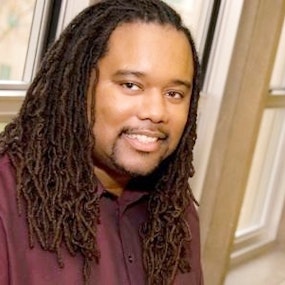
Kevin Coleman-Cohen
Film Director and Producer, College Professor, & Non-profit Program Director
Born and raised in St. Louis, MO, Director and Producer Kevin Coleman-Cohen studied under directors Bill Duke (Sister Act 2) and Haile Gerima (Sankofa). Kevin graduated from the prestigious American Film Institute (AFI) earning an MFA in Directing and Howard University earning a BA in Television and Film. His films circulate film festivals, winning awards and acclaim. Kevin's current short film, PRETTY BOY has screened at several major film festivals including the 2023 Pan African Film Festival, Martha's Vineyard African American Film Festival, St. Louis International Film Festival, KC FilmFest International, The Black Harvest Film Festival, the Los Angeles International Film Festival, and many other top tier festivals. The short film is about African American teen males engaging in sex work to survive on the streets of St. Louis. The film is based on Kevin's work with non-profit, Youth In Need, Inc.
In November 2023 Kevin received the Presidential Lifetime Achievement Award from President Joe Biden for his service work in the community specifically addressing youth homelessness and human trafficking. Kevin also earned an honorary doctorate (Ph.D) in Entertainment & Arts Management from Harvest Christian University.
New to the Podcast? Start listening to some of these episodes!
You can check out episodes by topic or season at the top and bottom of the page.















